
Lyon Sprague de Camp was an American writer of science fiction, fantasy and non-fiction. In a career spanning 60 years, he wrote over 100 books, including novels and works of non-fiction, including biographies of other fantasy authors. He was a major figure in science fiction in the 1930s and 1940s.

Sword and sorcery (S&S) is a subgenre of fantasy characterized by sword-wielding heroes engaged in exciting and violent adventures. Elements of romance, magic, and the supernatural are also often present. Unlike works of high fantasy, the tales, though dramatic, focus on personal battles rather than world-endangering matters. Sword and sorcery commonly overlaps with heroic fantasy.
The Gandalf Awards, honoring achievement in fantasy literature, were conferred by the World Science Fiction Society annually from 1974 to 1981. They were named for Gandalf the wizard, from the Middle-earth stories by J. R. R. Tolkien. The award was created and sponsored by Lin Carter and the Swordsmen and Sorcerers' Guild of America (SAGA), an association of fantasy writers. Recipients were selected by vote of participants in the World Science Fiction Conventions according to procedures of the older Hugo Awards.
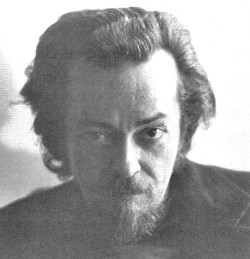
Linwood Vrooman Carter was an American author of science fiction and fantasy, as well as an editor, poet and critic. He usually wrote as Lin Carter; known pseudonyms include H. P. Lowcraft and Grail Undwin. He is best known for his work in the 1970s as editor of the Ballantine Adult Fantasy series, which introduced readers to many overlooked classics of the fantasy genre.

Elements of the supernatural and the fantastic were an element of literature from its beginning. The modern genre is distinguished from tales and folklore which contain fantastic elements, first by the acknowledged fictitious nature of the work, and second by the naming of an author. Works in which the marvels were not necessarily believed, or only half-believed, such as the European romances of chivalry and the tales of the Arabian Nights, slowly evolved into works with such traits. Authors like George MacDonald created the first explicitly fantastic works.

Flashing Swords! is a series of fantasy anthologies published by Dell Books from 1973 to 1981 under the editorship of Lin Carter. It showcased the heroic fantasy work of the members of the Swordsmen and Sorcerers' Guild of America (SAGA), a somewhat informal literary group active from the 1960s to the 1980s, of which Carter was the guiding force. Most of the important sword and sorcery writers at the time of the group’s founding were members; later, membership was extended to other fantasy authors.

Conan the Swordsman is a collection of seven fantasy short stories and associated pieces by writers L. Sprague de Camp, Lin Carter and Björn Nyberg featuring Robert E. Howard's sword and sorcery hero Conan the Barbarian. It was first published in paperback by Bantam Books in August 1978, and reprinted in 1981. Later paperback editions were issued by Ace Books. The first hardcover edition was published by Tor Books in December 2002. The first British edition was issued by Sphere Books in 1978. The book has also been translated into Italian and French. It was later gathered together with Conan the Liberator and Conan and the Spider God into the omnibus collection Sagas of Conan.

Sagas of Conan is a 2004 omnibus collection of three previously issued fantasy books written by L. Sprague de Camp, Lin Carter and Björn Nyberg featuring Robert E. Howard's sword and sorcery hero Conan the Barbarian. It was first published in paperback by Tor Books.
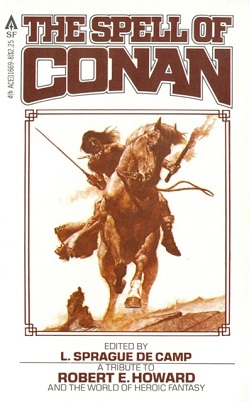
The Spell of Conan is a 1980 collection of essays, poems and fiction edited by L. Sprague de Camp, published in paperback by Ace Books. The material was originally published as articles in George H. Scithers' fanzine Amra. The book is a companion to Ace's earlier volume of material from Amra, The Blade of Conan (1979). Most of the material in the two volumes, together with some additional material, was reprinted from three previous books issued in hardcover by Mirage Press; de Camp's collection The Conan Reader (1968), and the de Camp and Scithers-edited anthologies The Conan Swordbook (1969). and The Conan Grimoire (1972).
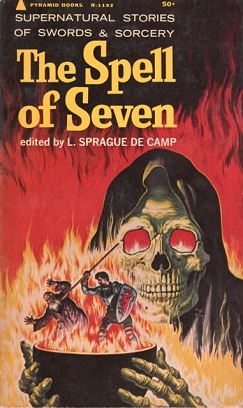
The Spell of Seven is an anthology of fantasy short stories in the sword and sorcery subgenre, edited by L. Sprague de Camp and illustrated by Virgil Finlay. It was first published in paperback by Pyramid Books in June 1965, and reprinted in December 1969. It was the second such anthology assembled by de Camp, following his Swords and Sorcery (1963).

The Fantastic Swordsmen is a 1967 anthology of fantasy short stories in the sword and sorcery subgenre, edited by American writer L. Sprague de Camp. It was first published in paperback by Pyramid Books. It was the third such anthology assembled by de Camp, following his earlier Swords and Sorcery (1963) and The Spell of Seven (1965). It has also been translated into German.

Warlocks and Warriors is an anthology of fantasy short stories in the sword and sorcery subgenre, edited by American writer L. Sprague de Camp. It was first published in hardcover by Putnam in 1970, and in paperback by Berkley Books in 1971. It was the fourth such anthology assembled by de Camp, following his earlier Swords and Sorcery (1963), The Spell of Seven (1965), and The Fantastic Swordsmen (1967).
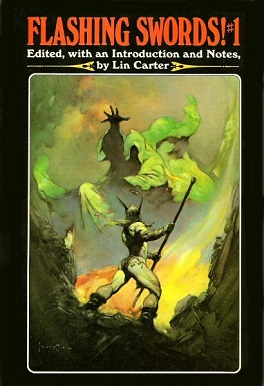
Flashing Swords! #1 is an anthology of fantasy stories, edited by the American writer Lin Carter. It was first published in hardcover by Nelson Doubleday in April 1973 as a selection in its Science Fiction Book Club, and in paperback by Dell Books in July the same year. The first British edition was issued by Mayflower in 1974.

Flashing Swords! #2 is an anthology of fantasy stories, edited by American writer Lin Carter. It was first published in hardcover by Nelson Doubleday in 1973 as a selection in its Science Fiction Book Club and in paperback by Dell Books in February 1974. The first British edition was issued by Mayflower in February 1975.

Flashing Swords! #3: Warriors and Wizards is an anthology of fantasy stories, edited by American writer Lin Carter. It was first published in paperback by Dell Books in August 1976. The first German edition was issued by Pabel in November 1978.
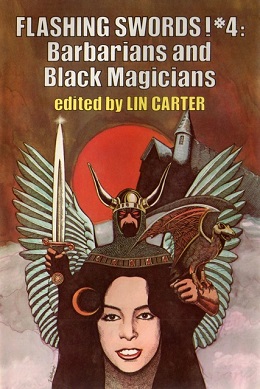
Flashing Swords! #4: Barbarians and Black Magicians is an anthology of fantasy stories, edited by Lin Carter. It was first published in hardcover by Nelson Doubleday in May 1977 as a selection in its Science Fiction Book Club, and in paperback by Dell Books in November 1977.
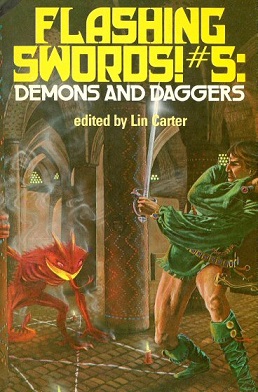
Flashing Swords! #5: Demons and Daggers is an American anthology of fantasy stories, edited by American writer Lin Carter. It was first published in hardcover by Nelson Doubleday in December 1981 as a selection in its Science Fiction Book Club, and in paperback by Dell Books simultaneously.

Swords Against Tomorrow is an anthology of fantasy stories, edited by Robert Hoskins. It was first published in paperback by Signet Books in August 1970.
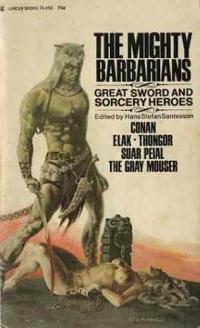
The Mighty Barbarians: Great Sword and Sorcery Heroes is a 1969 anthology of fantasy short stories in the sword and sorcery subgenre, edited by Hans Stefan Santesson. It was first published in paperback by Lancer Books in 1969, and was later followed up by the subsequent Lancer anthology The Mighty Swordsmen. It has been translated into Dutch. Robert M. Price edited a later-day homage to both anthologies called The Mighty Warriors (2018).
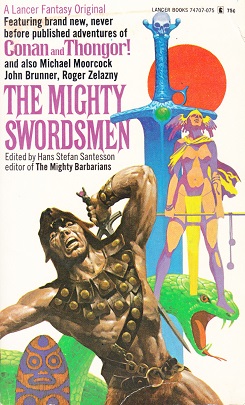
The Mighty Swordsmen is a 1970 anthology of fantasy short stories in the sword and sorcery subgenre, edited by Hans Stefan Santesson. It was first published in paperback by Lancer Books in December 1970, and was a follow-up to the earlier Lancer anthology The Mighty Barbarians. Robert M. Price edited a later-day homage to both anthologies called The Mighty Warriors (2018).



















